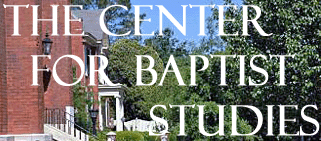|
In the late 1970s two men, Paige Patterson and Paul
Pressler, devised a plan to takeover the Southern Baptist Convention
and change its direction. Their strategy inserted an alien
winner-take-all system of power politics into the life of our
denomination.
Patterson and Pressler studied the SBC's
constitution and bylaws and discovered that the convention was
ultimately controlled by the appointment powers of the president. By
electing change minded presidents for ten consecutive years and
having those presidents appoint only change minded people to serve
as trustees, within ten years they could replace the heads of all
SBC institutions and agencies with change minded administrators.
Beginning in 1979, that is what they did.
After extensive political organizing and busing
messengers in to vote for convention presidents, the Pressler-Patterson
coalition succeeded in winning elections by an average 55% to 45%
ratio. In the late 1980's some opposition was organized, but it was
too little and too late. By the early 1990s most traditional
Baptists had dropped out of the SBC. This essentially gave the
Patterson-Pressler coalition a free hand to change the SBC.
How has the SBC changed since 1979?
The Patterson-Pressler coalition changed the
role of the pastor in Baptist church life.
In traditional Baptist thought all members of the
church were seen as equal ministers with different spiritual gifts
-- a doctrine referred to as the priesthood of believers. The role
of the pastor in this context was to preach and teach, to train the
congregation for service, to care for the needs of the congregation,
and to provide administrative coordination to the work of the
church. Pastors were viewed as servants of the church.
The Patterson-Pressler coalition insists that the
pastor is the unquestioned ruler of the church. W. A. Criswell said,
"Lay leadership of the church is unbiblical when it weakens the
pastor's authority as ruler of the church . . . a laity-led church
will be a weak church anywhere on God's earth. The pastor is ruler
of the church." In 1988 the Southern Baptist Convention passed a
resolution affirming that the pastor was the ruler of the church.
This new emphasis on pastoral authority marks a
departure from the traditional Baptist teaching on the priesthood of
every believer.
The Patterson-Pressler coalition changed the
educational process at the seminaries.
Traditionally, Baptists expected seminary professors
to expose their students to various theological viewpoints. Baptist
teachers were viewed as facilitators who guided students as they
studied the scriptures and conscientiously formed their own
theological convictions. This approach was in
harmony with the traditional Baptist understanding that every
believer has the right and responsibility to interpret the
scriptures under the direct illumination of the Holy Spirit. It also
acknowledged that every believer is accountable directly to God for
conscientiously interpreting scripture, forming convictions, and
living by them.
The Patterson-Pressler coalition expects seminary
professors to indoctrinate their students to a very narrow
theological viewpoint. Adrian Rogers (the first SBC president
elected by the Patterson- Pressler coalition) said, "If we say
pickles have souls, they (seminary professors) better teach that
pickles have souls." Seminary teachers who refused to comply were
fired, sought employment elsewhere, or took early retirement. Their
replacements are indoctrinators who have usurped the place of the
Holy Spirit and now presume to make Southern Baptists accountable
for living according to the interpretations and convictions of the
Patterson-Pressler coalition.
The Patterson-Pressler coalition changed the
use of confessions.
In Baptist thought doctrinal
statements or confessions of faith never had authority over the
individual conscience or over the local church. Southern Baptists in
1925 and 1963 stated, "Confessions are only guides in
interpretation, having no authority over the conscience." However,
in 2000 the Patterson-Pressler coalition stated that confessions are
to be used as "instruments of doctrinal accountability."
To whom are Southern Baptists now accountable for
their beliefs? Are lay people accountable to their pastors? Are
local churches accountable to their associations? Are associations
accountable to their state conventions? Are state conventions
accountable to the national convention? This trend toward hierarchy
violates the autonomy of local churches and the freedom of all
believers to discern and follow God's will according to the dictates
of their own consciences.
The Patterson-Pressler coalition changed the
way the Bible is viewed.
In 1963, Southern Baptists held that the scriptures
were a record of God's self-revelation. After revealing his creative
purpose and holiness to the patriarchs and prophets of Israel, God
supremely and personally revealed himself through incarnation in
Jesus. God inspired patriarchs, prophets, apostles, and others to
record his acts of self-revelation in writing. This written record,
the Bible, serves as the Christian's guide for matters of belief and
conduct. Since the supreme revelation of God was in Christ, He is
the criterion by which scripture is to be interpreted. The entire
Bible must be understood in light of Jesus' teachings and example.
The Patterson-Pressler coalition refuses to affirm
that the Bible is a "record" of God's revelation. For them, the
Bible is God's supreme revelation of Himself. They contend that
nothing can be known of Jesus apart from the Bible. The Bible,
therefore, holds a position equal to or greater than Jesus. They
also deny that Christ is the criterion for biblical interpretation.
For them, the revelation of the Old Testament holds equal authority
to the New Testament. Leviticus reveals as much as about God as does
Matthew's gospel. Patterson and Pressler accuse anyone who
challenges their view of not believing the Bible.
The Patterson-Pressler coalition changed
church/state relations.
Historically, Southern Baptists were strong
advocates for church-state separation. We insisted that the state
remain neutral on religious issues in order to protect liberty of
conscience for religious minorities.
Baptists shaped public morality though the witness
of the church rather than the through the power of the state. For
more than sixty years, Southern Baptists have advocated this
position through the work of the Baptist Joint Committee on Public
Affairs in Washington D.C.
W.A. Criswell stated that separation of church and
state was the figment of some infidel's imagination.
The Patterson-Pressler coalition favors church-state
accomodation. They intend to promote specific religious agendas
through public policy and want religious majorities to have greater
access to public funds to do so. The Patterson-Pressler coalition
has defunded the Baptist Joint Committee and created an Ethics and
Religious Liberty Commission to promote their accomodationist agenda
in Washington D.C.
The Patterson-Pressler coalition reversed
the advances made by women.
In 1845, when the SBC began, the role of women in
society, church, and the family was rather restricted. In time,
things begin to change. Among advocates for change were noted
Baptist missionaries such as Lottie Moon and Annie Armstrong. WMU
was very instrumental in advancing the role of women in church life.
By the 1960's, churches were calling women as committee chairs,
deacons and ministers.
The Patterson-Pressler began a reversal of these
developments. In 1984 the SBC passed a resolution stating that women
were excluded from being deacons or pastors. They ignored examples
like Phoebe the deaconess in Romans 16:1 and insisted that women
must submit to men because a woman was the first to sin in the
garden of Eden. In 1998 Southern Baptist called upon women to
"graciously submit" to their husbands, ignoring the fact that
Ephesians 5:21 calls for mutual submission in the
Christian home. Two years later, the 2000 Baptist Faith and Message
confession stated that women could not serve as pastors. All who
work for the SBC as missionaries or as teachers in the seminaries
must now affirm and teach these ideas about women.
Currently, in clear violation of local church
autonomy, many associations are censuring or excluding churches that
ordain women.
Can you conscientiously support all these changes? |

